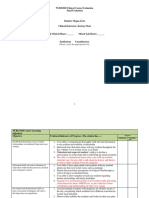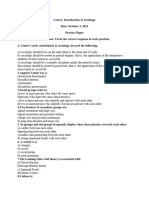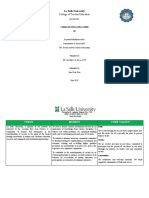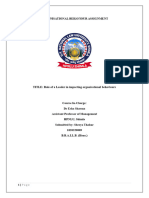0 ratings0% found this document useful (0 votes)
29 viewsGordon
Gordon
Uploaded by
perezThis document summarizes Gordon's Functional Health Pattern Assessment of a patient before and during hospitalization according to interviews with the patient's wife.
Before hospitalization, the patient had some minor memory issues but was generally healthy, happy, and able to care for himself. During hospitalization, his cognitive and physical abilities declined significantly - he could no longer recognize or communicate clearly with his family and felt like a burden. This decline in health perception, self-concept, and role functioning reflects the worsening of the patient's cognitive impairment during his hospital stay.
Copyright:
© All Rights Reserved
Available Formats
Download as DOCX, PDF, TXT or read online from Scribd
Gordon
Gordon
Uploaded by
perez0 ratings0% found this document useful (0 votes)
29 views8 pagesThis document summarizes Gordon's Functional Health Pattern Assessment of a patient before and during hospitalization according to interviews with the patient's wife.
Before hospitalization, the patient had some minor memory issues but was generally healthy, happy, and able to care for himself. During hospitalization, his cognitive and physical abilities declined significantly - he could no longer recognize or communicate clearly with his family and felt like a burden. This decline in health perception, self-concept, and role functioning reflects the worsening of the patient's cognitive impairment during his hospital stay.
Copyright
© © All Rights Reserved
Available Formats
DOCX, PDF, TXT or read online from Scribd
Share this document
Did you find this document useful?
Is this content inappropriate?
This document summarizes Gordon's Functional Health Pattern Assessment of a patient before and during hospitalization according to interviews with the patient's wife.
Before hospitalization, the patient had some minor memory issues but was generally healthy, happy, and able to care for himself. During hospitalization, his cognitive and physical abilities declined significantly - he could no longer recognize or communicate clearly with his family and felt like a burden. This decline in health perception, self-concept, and role functioning reflects the worsening of the patient's cognitive impairment during his hospital stay.
Copyright:
© All Rights Reserved
Available Formats
Download as DOCX, PDF, TXT or read online from Scribd
Download as docx, pdf, or txt
0 ratings0% found this document useful (0 votes)
29 views8 pagesGordon
Gordon
Uploaded by
perezThis document summarizes Gordon's Functional Health Pattern Assessment of a patient before and during hospitalization according to interviews with the patient's wife.
Before hospitalization, the patient had some minor memory issues but was generally healthy, happy, and able to care for himself. During hospitalization, his cognitive and physical abilities declined significantly - he could no longer recognize or communicate clearly with his family and felt like a burden. This decline in health perception, self-concept, and role functioning reflects the worsening of the patient's cognitive impairment during his hospital stay.
Copyright:
© All Rights Reserved
Available Formats
Download as DOCX, PDF, TXT or read online from Scribd
Download as docx, pdf, or txt
You are on page 1of 8
A.
Gordon’s Functional Pattern of Assessment
Gordon’s Before Hospitalization During Hospitalization Analysis
Assessment
Health Perception
-Health
Management
Pattern
Nutritional –
Metabolic Pattern
Elimination
Pattern
Activity Exercise
Pattern
Sleep Rest
Pattern
Cognition ‘’Noong hindi pa siya ‘’Lumala yung pagiging According to
Perceptual nahohospital makakalimutin niya noong na Edelman et al.
Pattern makakalimutin na siya, hospital siya, minsan hindi (2014). The
madalas niyang niya narin makilala yung mga cognitive-
makalimutan yung mga anak niya at kung tatanungin perceptual health
gamit kung saan niya siya kung anong nangyari pattern reflects
nailapag’’ as verbalized kahapon hindi niya nayun each individual's
by the wife of patient maalala’’ as verbalized by ability to
the wife of patient understand,
process, and use
information, as
well as make
appropriate
decisions based
on their
knowledge.
Although the
ability to acquire
new information
appears to
decline with age,
this could be due
to a lack of desire
to learn rather
than an inability
to acquire and
retain the
information. Prior
to hospitalization,
the patient's wife
stated that her
husband
sometimes
forgets where he
puts his things,
but his wife
always guided
him if he forgot
something.
During his
hospitalization,
his cognitive
impairment has
worsened to the
point where he
can't even
remember the
names of his
children
Self ‘’Maayos naman siya ‘’ Pero noong na hospital siya According to
Perception/Self noon, wala naman siya hindi na siya nakakausap ng nurse key ( 2016)
Concept Pattern nagiging problema sa maayos, hindi narin People's self-
sarili nya masaya siya na maintindihan kung anong identities are
nagagawa parin niya gusto niyang sabihin. formed through
yung mga bagay na Tinuturo nalang niya kung their values, life
gusto niya hindi niya may gusto siyang ipakuha. experiences, and
naiisip na tumatanda na Nalulngkot siya pag nakikita interactions with
siya bagkus naiisip niya niya akong nahihirapan’’ as others. Certain
na malakas pa siya’ as verbalized by the wife of characteristics
verbalized by the wife of patient are shared by
patient people who have
a strong sense of
self-worth and
self-esteem. They
have strong
personal values
and believe they
have control over
their lives. Aging
individuals
develop their own
perceptions of
aging. It is difficult
to see oneself
getting old. Many
older adults
express dismay
with the
realization and
can even identify
a particular
moment when
they perceived
themselves as
old. Prior to
hospitalization,
the patient was
content with his
life with his
family, he doesn't
think he's getting
old because he
can still do the
things he wants
to do. However,
during his
hospitalization, he
was very sad
because
everything was
limited to him,
and he felt like he
was becoming a
burden.
Role Relationship ‘’Mabuti naman siyang ‘’ Simula noong na hospital According to
Pattern asawa at ama ng mga siya hindi na siya Peterson (2009),
anak namin, nakakapasok sa trabaho The importance
nagagampanan naman niya, kaya hirap kami ngayon
of roles in healthy
niya ng maayos yung sa gastusin sa bahay sa mga
family
tungkulin at anak niya at dito sa hospital.
functioning could
responsibilidad niya’’ as as verbalized by the wife of
be emphasized.
verbalized by the wife of patient
Most researchers
patient
agree that
establishing clear
roles within a
family is directly
related to a
family's ability to
deal with day-to-
day life,
unexpected crises,
and the normal
changes that
occur in families
over time. Before
being admitted to
the hospital, the
patient is aware of
his roles and
responsibilities as
a husband, father,
and grandfather.
During
hospitalization,
the patient may
experience
memory lapses
and may be
unable to recall
his family, but he
continues to feel
them and love his
family.
Coping Stress ‘’ Hindi naman siya ‘’ Noong nandito siya sa According to
Tolerance Pattern madalas ma stress noon, hospital madalas siyang Heijligers (2022)
pag wala siyang magawa magwala, sabi niya gusto na Stress tolerance
nanonood lang siya ng daw niyang unuwi, sinasabi is the ability to
TV. Minsan nakikipag nalang namin na hindi pa deal with stressful
kwentuhan siya sa mga pwede sabi ng Doctor niya, situations without
kaibigan niya pero wala magwawala yan pero hihinto becoming
siyang bisyo hindi rin din pag napagod na’’ as overwhelmed.
siya nagsusugal. verbalized by the wife of People strong in
Masipag siya sa patient Stress Tolerance
Trabaho’’ as verbalized can withstand
by the wife of patient and may even
thrive in high-
pressure
situations. When
a deadline is
moved up, they
effectively rise to
the challenge of
wrestling
problems to
resolution. Prior
to hospitalization,
the patient was
coping with his
stress on his own.
However, when
he was admitted
to the hospital, he
became
distressed, and
his wife was the
one who helped
him cope with the
stress.
Sexuality ‘’noong hindi pa kami ‘’ Hindi na talaga kami According to
Reproductive matanda sexually active nagsisiping simula noong family doctor
Pattern kami, pero noong hindi pa siya nahohospital (2019). A state of
tumanda na hindi na’’ as hanggang ngayon’’ as complete
verbalized by the wife of verbalized by the wife of physical, mental,
patient patient and social well-
being in all
aspects of the
reproductive
system is defined
as good sexual
and reproductive
health. It implies
that people can
have a fulfilling
and safe sexual
life, as well as the
ability to
reproduce.
However, sexual
desires may
change as people
age. The patient
was very active
on his younger
days but he tends
to have less
intercourse as
they get older.
And during
hospitalization the
wife of the patient
stated that his
husband is
already contented
on what he has
right now, he has
his family that
taking care of him
so he is
completely
satisfied with his
life.
Values Belief ‘’Katoliko po kami, ‘’Simula noong na hospital According to
Pattern madalas po kami siya hindi na kami Puchalski C. M.
magsimba noon ng nakakapunta para magsimba (2001). Everyone
asawa ko’’ as verbalized pero nagdadasal parin po has their own way
by the wife of patient kami lagi’’ as verbalized as of coping with
verbalized by the wife of pain and finding
patient hope in times of
distress. When
walking through a
health crisis,
many turn to
spirituality for
comfort, and
many people find
their spiritual
center in religion.
Patients who are
spiritual may
utilize their beliefs
in coping with
illness, pain, and
life stresses.
Some studies
indicate that
those who are
spiritual tend to
have a more
positive outlook
and a better
quality of life
You might also like
- Family Coping IndexDocument5 pagesFamily Coping IndexDarcey NicholeNo ratings yet
- Bag Technique RationaleDocument3 pagesBag Technique Rationalekatemoroel.sumaitNo ratings yet
- Journey To A DiagnosisDocument4 pagesJourney To A DiagnosisMark HayesNo ratings yet
- Final Eval Megan SDocument6 pagesFinal Eval Megan Sapi-382642757No ratings yet
- 5 6143114199032663577Document4 pages5 6143114199032663577Wayne N. LlanosNo ratings yet
- BIOlogy VirologyDocument3 pagesBIOlogy VirologySukrit AnshumaanNo ratings yet
- Data Information: Information According To Whom?Document6 pagesData Information: Information According To Whom?Jazzd Sy GregorioNo ratings yet
- Home Visit Record (HVR) #1: Baseline of DataDocument3 pagesHome Visit Record (HVR) #1: Baseline of DataphoebeNo ratings yet
- RPL FormDocument4 pagesRPL Formribeiro.plaisNo ratings yet
- Ysterious NimalDocument8 pagesYsterious NimalAlanNo ratings yet
- Actual AlzheimersDocument3 pagesActual AlzheimersArone SebastianNo ratings yet
- RPL Form SignedDocument4 pagesRPL Form Signedribeiro.plaisNo ratings yet
- Procedure Rationale Remarks: Home VisitDocument3 pagesProcedure Rationale Remarks: Home VisitBSN CMUNo ratings yet
- TMT 210307 D004CDocument1 pageTMT 210307 D004CTim ThorsenNo ratings yet
- Assignment2GradingRubricWedaft Group13Document5 pagesAssignment2GradingRubricWedaft Group13agampreetkour14No ratings yet
- Home Visit RationaleDocument3 pagesHome Visit Rationalekatemoroel.sumaitNo ratings yet
- NCP - MS FamilyDocument3 pagesNCP - MS FamilyMark Zedrix MediarioNo ratings yet
- NCP 1 CoaDocument11 pagesNCP 1 CoaTel EscorialNo ratings yet
- April 11Document12 pagesApril 11Alen Estabillo CalumpangNo ratings yet
- NCP CholeraDocument4 pagesNCP CholeraARISNo ratings yet
- Complementary and Integrative Health Care Management of Dementia Among The Elderly in CaviteDocument13 pagesComplementary and Integrative Health Care Management of Dementia Among The Elderly in Caviteperez100% (1)
- What Is Self-Harm?: Mental Disorder Kill ThemselvesDocument2 pagesWhat Is Self-Harm?: Mental Disorder Kill ThemselvesperezNo ratings yet
- What Is Post Traumatic Stress DiorderDocument3 pagesWhat Is Post Traumatic Stress DiorderperezNo ratings yet
- Livestock MarketingDocument4 pagesLivestock MarketingperezNo ratings yet
- What Is Technology LiteracyDocument1 pageWhat Is Technology LiteracyperezNo ratings yet
- Publication Water LawDocument3 pagesPublication Water LawperezNo ratings yet
- Publications: Finance and Credit: Financing The Farm: A Law Bulletin Series On Legal Arrangements For Farm FinancingDocument3 pagesPublications: Finance and Credit: Financing The Farm: A Law Bulletin Series On Legal Arrangements For Farm FinancingperezNo ratings yet
- The Renewable Fuels Standard Provisions Under The Clean Air ActDocument4 pagesThe Renewable Fuels Standard Provisions Under The Clean Air ActperezNo ratings yet
- 12th Maths EM Public Exam 2023 Model Question Paper 3 English Medium PDF DownloadDocument6 pages12th Maths EM Public Exam 2023 Model Question Paper 3 English Medium PDF Downloadspidystark000000000No ratings yet
- Chapter 1. The Problem and Its BackgroundDocument22 pagesChapter 1. The Problem and Its Backgroundstephanie maloloyonNo ratings yet
- Reflection Paperin Practical Research 1Document2 pagesReflection Paperin Practical Research 1Andrei LacatariaNo ratings yet
- SOCI1002 Practice TestDocument5 pagesSOCI1002 Practice TestMeisha GunnNo ratings yet
- Module 2 Section 7 Objective and Home ActivitiesDocument4 pagesModule 2 Section 7 Objective and Home Activities玛丽亚No ratings yet
- Teacher Recruitment PowerPointDocument18 pagesTeacher Recruitment PowerPointMithat TakunyacıNo ratings yet
- Study On Gender in Physics PDFDocument7 pagesStudy On Gender in Physics PDFHOÀNG BAO NGUYỄNNo ratings yet
- Essay On Scientific DevelopmentDocument6 pagesEssay On Scientific Developmentafibxejjrfebwg100% (2)
- Translatoon 2Document8 pagesTranslatoon 2gowtham srinivasanNo ratings yet
- 8 EngDocument27 pages8 EngNikaNikaNo ratings yet
- Paper 3Document6 pagesPaper 3venkatesh maduthuriNo ratings yet
- Management Science Era and Integrated Approach: Departemen Teknik IndustriDocument80 pagesManagement Science Era and Integrated Approach: Departemen Teknik IndustriMiracle2290No ratings yet
- BISCAST 98, Peñafrancia Ave, Naga, Camarines SurDocument5 pagesBISCAST 98, Peñafrancia Ave, Naga, Camarines SurNiña Joy A MalipotNo ratings yet
- IB Psychology - Cultural Dimensions (Extended Response)Document2 pagesIB Psychology - Cultural Dimensions (Extended Response)Diya BharathNo ratings yet
- Interpreting GraphsDocument1 pageInterpreting GraphsCZYRA NI�A SALUTANNo ratings yet
- Jawaban UTS Bhs Inggris - Widi Gilang Hariyono - 201400107Document4 pagesJawaban UTS Bhs Inggris - Widi Gilang Hariyono - 201400107Widi GilangNo ratings yet
- Met A CognitionDocument29 pagesMet A CognitionCMPO PhilsecretariatNo ratings yet
- Moh New Employee Onboarding Checklist First Month v0.1Document3 pagesMoh New Employee Onboarding Checklist First Month v0.1hannahcollinson3No ratings yet
- Seminar Report FormatDocument5 pagesSeminar Report FormatSAURABH TANWARNo ratings yet
- Final Requirement TemplateDocument8 pagesFinal Requirement TemplateRenilyn GuindoawonNo ratings yet
- Research Proposal GuidelinesDocument10 pagesResearch Proposal GuidelinesĐinh Thúy HàNo ratings yet
- Exploring The Contributing Factors Affecting College Students Low Self-EsteemDocument2 pagesExploring The Contributing Factors Affecting College Students Low Self-EsteemHannah BolagaoNo ratings yet
- Monitoring ExamDocument3 pagesMonitoring ExamRochelle Onelia BaldeNo ratings yet
- Energy Lesson PlanDocument10 pagesEnergy Lesson PlanTrudy- Ann CaineNo ratings yet
- Teaching Profession AnswerDocument20 pagesTeaching Profession AnswerRezel SyquiaNo ratings yet
- Survey QuestionnaireDocument2 pagesSurvey QuestionnairepogisimpatikoNo ratings yet
- GW3 U1L3 (Brainstorming - Titles)Document9 pagesGW3 U1L3 (Brainstorming - Titles)Arturo HernándezNo ratings yet
- Management ShreyaDocument21 pagesManagement Shreyashreyabba22009No ratings yet
- S2 Business StreamDocument1 pageS2 Business Streamderrickandile424No ratings yet
- EBOOK Guide To Evaluation of Functional Ability How Request Interpet and Apply Download Full Chapter PDF Docx KindleDocument62 pagesEBOOK Guide To Evaluation of Functional Ability How Request Interpet and Apply Download Full Chapter PDF Docx Kindledavid.lucero121100% (49)

























































